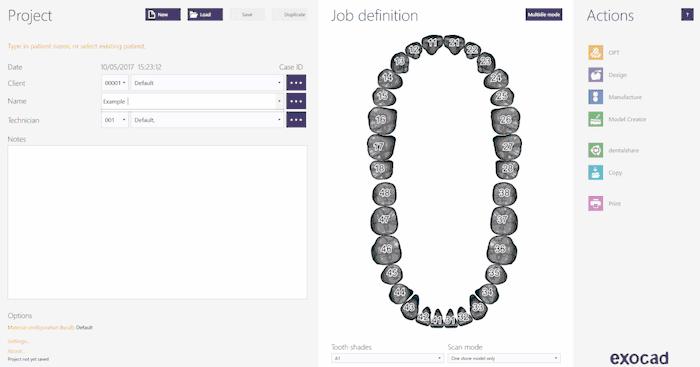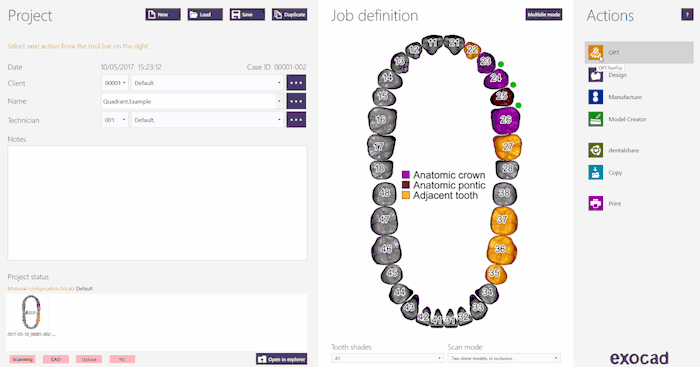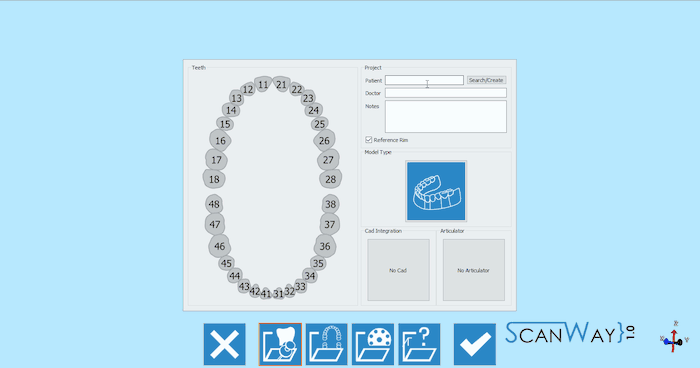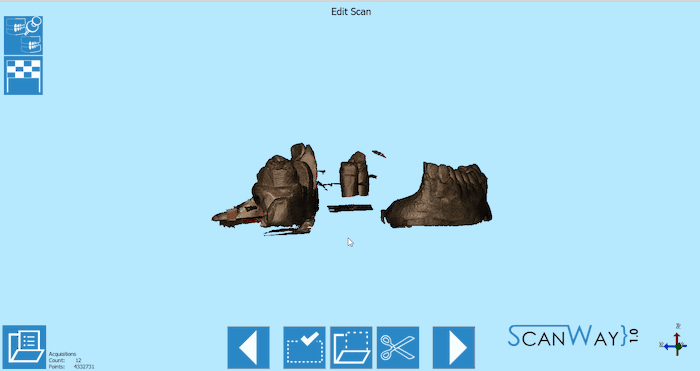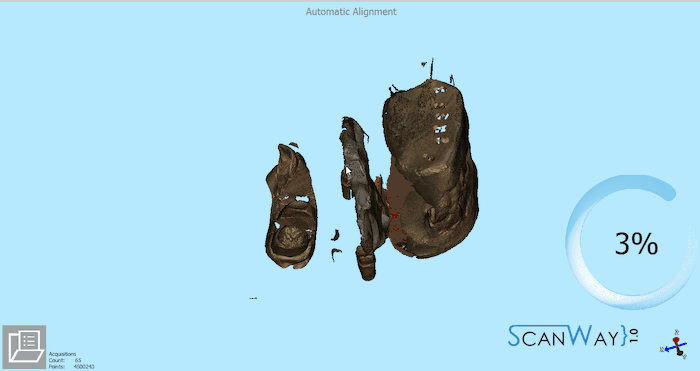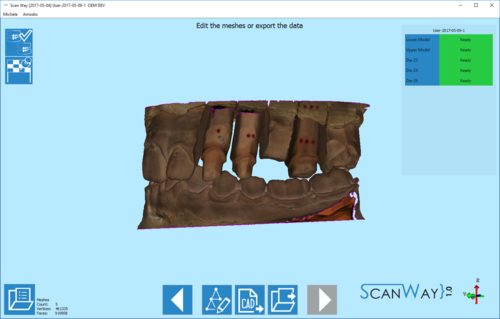Example: Quadrant Module
このページでは、咬合する2つの1/4顎モデルと3つのダイを、オープンテクノロジーのクオドラントモジュールを使ってスキャンする例を、ウィザードに従って説明します。
このモジュールでは、1/4顎のモデルと最大4つの歯型を、2ステップで定義されたプロジェクトでスキャンできます。これでスキャン時間が半分になります。
これは追加ライセンス用モジュールです。詳細はディーラーにお問い合わせ下さい
Contents
Exocadでプロジェクト定義を開始する
このプロジェクトをExocadで作成するには、デスクトップでDentalDBアイコンをクリックします。プロジェクトマネージャーが開きます。
プロジェクト情報、設計する修復の種類、その他のパラメーターを入力します。この種類のプロジェクトでは、Scan Mode(スキャンモード)がTwo stone models in occlusion(咬合する2つの石膏模型)に設定されていることを確認して下さい。モデルのタイプは後で指定され、それにより正しいウィザードが起動します。
Exocadでプロジェクトを作成する方法について詳しくは、Exocad Wiki!を参照して下さい。
今回のデモ用プロジェクトでは以下の通りプロジェクトを定義します。
プロジェクトが定義されたら、アクションセクションでOPTをクリックすると、スキャンソフトウェアが起動します。
スキャンソフトウェアでは、まずExocadで作成されたプロジェクトが表示されます。
正しいウィザードを有効にするには、Model Type(モデルタイプ)アイコンをクリックして、![]() オプションを選択します。
オプションを選択します。
確定ボタン ![]() をクリックすると、変更内容が保存され、プロジェクトが開始されます。
をクリックすると、変更内容が保存され、プロジェクトが開始されます。
ScanWayでプロジェクト定義を開始する
All projects can be defined in the scanning software as well, regardless the CAD that will be later on used to design.
Launch the scanning software double-clicking on the ScanWay icon on your desktop. The Welcome Page will open; to create the project click on the first icon.
For detailed information on how to define a project visit the specific page: Create a New Project.
Here is the definition of our demo project:
Both the project definitions described lead to the same wizard, which will be now followed step by step.
Step 1: Articulator Scanning
In this case, for articulator, is meant the quadrant tray occlusor, which can be scanned directly on the normal model holder.
The user can decide freely how to place the occlusor on the model holder, here are our suggestions.
Once the objects have been placed in the scanner (either the articulator or the models one on top of the other), the scan can be started with the Scan Button![]() . Once the scan is finished the result will be shown.
. Once the scan is finished the result will be shown.
For further information on the other available functions check the Scan Interface page.
Click ![]() to access the second step of the wizard.
to access the second step of the wizard.
Step 2: Quadrant Scan
This step develops in the usual phases.
Scan
For this step, all the elements need to be positioned as marked by the software in the Quadrant holder.
Click the Scan Button![]() to start the scan. Once the scan is finished the result will be shown.
to start the scan. Once the scan is finished the result will be shown.
Click ![]() to access the edit step.
to access the edit step.
Edit
In this case, the image has been trimmed using the base cut tool and clicking on the apply button.
BE CAREFUL NOT TO TRIM TOO MUCH, AS TO DO SO THE SOFTWARE MIGHT HAVE ISSUES DURING THE AUTOMATIC ALIGNMENT
Click ![]() to access the alignment phase.
to access the alignment phase.
Alignment
As for all scanned items, the software tries to align all the images to their reference. In this case the reference for all the scanned items is the articulator scan.
At the end of the alignment the results are shown. To learn more on the automatic alignment and the manual procedure visit our Alignment Interface page.
Click ![]() to access the last step of the wizard.
to access the last step of the wizard.
Step 3: Mesh Generation and Export
At this point the software immediately starts mesh generation. The meshes can be edited and exported individually or as a unique image. To learn more about mesh editing visit our Mesh Tools page.
Click on the Export Button ![]() to export to CAD.
to export to CAD.
If the project has been started from Exocad, the CAD will automatically open and the design can be started immediately. Otherwise the software will ask the user how to export the file.
